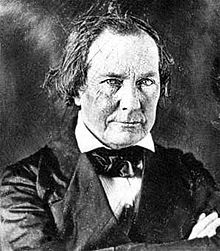Mirabeau B. Lamar
| Mirabeau Buonaparte Lamar | |
|---|---|
 |
|
| 2nd President of the Republic of Texas | |
|
In office December 10, 1838 – December 13, 1841 |
|
| Vice President | David G. Burnet |
| Preceded by | Sam Houston |
| Succeeded by | Sam Houston |
| 1st Vice-President of the Republic of Texas | |
|
In office October 22, 1836 – December 10, 1838 |
|
| President | Sam Houston |
| Preceded by | Lorenzo de Zavala (interim) |
| Succeeded by | David G. Burnet |
| 4th United States Ambassador to Nicaragua | |
|
In office February 8, 1858 – May 20, 1859 |
|
| President | James Buchanan |
| Preceded by | John H. Wheeler |
| Succeeded by | Alexander Dimitry |
| 2nd United States Ambassador to Costa Rica | |
|
In office September 14, 1858 – May 20, 1859 |
|
| President | James Buchanan |
| Preceded by | Solon Borland |
| Succeeded by | Alexander Dimitry |
| Personal details | |
| Born |
August 16, 1798 near Louisville, Georgia |
| Died | December 19, 1859 (aged 61) near Richmond, Texas |
| Resting place | Morton Cemetery, Richmond, Texas 29°35′09″N 95°45′48″W / 29.5858°N 95.7633°W |
| Nationality | American, Texian |
| Political party |
Democratic-Republican Party Democratic Party |
| Spouse(s) | Tabitha Jordan Lamar (died 1830) Henrietta Maffitt |
| Relations |
Lucius Q. C. Lamar (brother) Lucius Q. C. Lamar II (nephew) |
| Children | Rebecca Ann Lamar (born c. 1827) Loretto Evalina Lamar |
Mirabeau Buonaparte Lamar (August 16, 1798 – December 19, 1859) was a Texas politician, poet, diplomat and soldier who was a leading Texas political figure during the Texas Republic era. He was the second President of the Republic of Texas after David G. Burnet (1836 as ad-interim president) and Sam Houston.
Lamar grew up at Fairfield, which is also his father's plantation near Milledgeville, Georgia. As a child, he loved to read and educated himself through books. Although he was accepted to Princeton University, Lamar chose not to attend. He started work as a merchant and then ran a newspaper, but both of those enterprises failed.
In 1828, Lamar's family connections helped him to gain a position as the private secretary to Georgia Governor George M. Troup. In this position, Lamar issued press releases and toured the state giving speeches on behalf of the governor. On one of his trips, he met Tabitha Burwell Jordan, whom he married in 1826.
When Troup lost his reelection bid in 1828, Lamar established a newspaper in Columbus, Georgia, the Columbus Enquirer. This venture was much more successful than his previous business attempts. In 1830 his wife Tabitha died of tuberculosis. Lamar was deeply affected and took time to recover his drive. He withdrew his name from consideration for re-election to the Georgia Senate, in which he had served one term.
Lamar began to study law. He was admitted to the bar in 1833 and ran an unsuccessful campaign for a seat in the U.S. Congress.
Lamar's brother Lucius committed suicide in 1834. A grief-stricken Lamar began traveling to escape his memories. In the summer of 1835, he reached Texas, then part of Mexico. He decided to stay, where he was visiting his friend James Fannin. He had recently settled there and was working as a slave trader in Velasco.
...
Wikipedia
